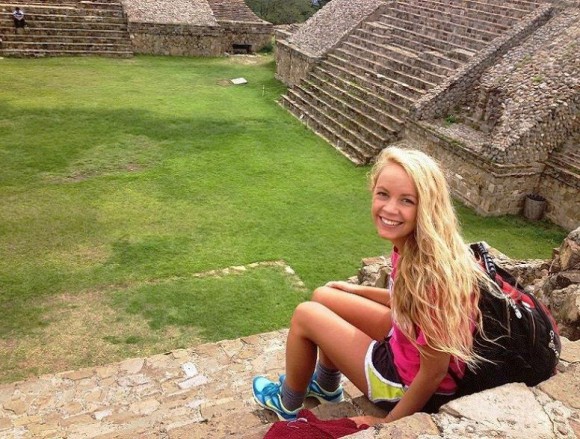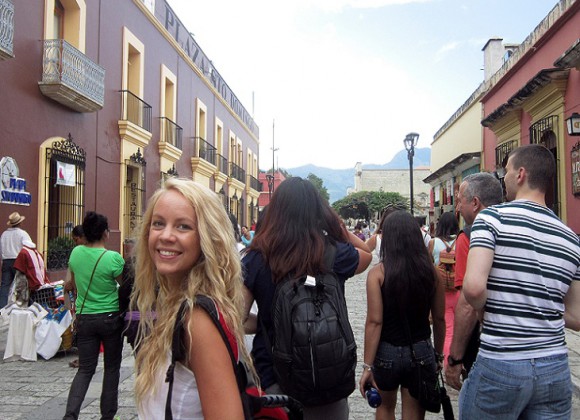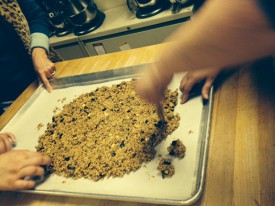
Katie Fudacz at Monte Albán, a large pre-Columbian archaeological site in the Santa Cruz Xoxocotlán Municipality in the southern Mexican state of Oaxaca.
When Katie Fudacz (SEBS Dec. ‘14) embarked on her G. H. Cook Honors Program thesis, little did she know it would be her calling card for several job offers in her senior year, including the one she finally chose with Bloomberg L.P.
“I really didn’t see myself working in the private sector,” said Fudacz. “As as a first-year student, I always envisioned myself working for a radical environmental organization like Greenpeace.” Fudacz majored in International Environmental Policy, with concentrations in sustainable agriculture, women’s leadership and Spanish.
She felt so deeply rooted in environmental policy that for three of her four years at Rutgers, she was a staff writer for The EPIB Trail, a monthly online newsletter written by students in the Department of Human Ecology that features eco-friendly ideas and current environmental news, plus departmental highlights of students, teaching assistants and faculty.
Fudacz was indoctrinated in environmental justice and policy even before she got to Rutgers.
“During my sophomore year of high school, I was provided with an opportunity to study environmental conservation on a biological reserve in Costa Rica,” she explains. “While living amidst the lush, colossal vegetation of the Costa Rican Rainforest, I witnessed private construction companies illegally clear cutting trees in order to build tourist hotels.”
This experience opened her eyes. “It was the first time I became aware of exploitation, both of natural resources and indigenous peoples, and it helped to solidify my lifelong commitment to environmental stewardship and intergenerational equity.”
When Fudacz arrived at Rutgers, she felt fortunate to have the guidance and mentorship of George Clark, professor in the Department of Human Ecology.
“I was unsure if I wanted to study environmental science, toxicology, ecology, international environmental policy or biology, but Dr. Clark always reassured me that ‘it is better to have too many passions than none’,” remembers Fudacz.
After taking Professor Clark’s “Human Ecology” course, she fell in love with the study of agricultural sustainability and international environmental policy. In addition to choosing courses that deepened this interest, Fudacz also sought out related internships that broadened her horizons and brought her into contact with indigenous and immigrant communities.

Katie Fudacz traveled with the NGO Puente a la Salud Comunitaria to teach women how to grow, process, cook and commercialize amaranth. She’s pictured in Capulalpam de Méndez, a town in the Sierra Juárez in Oaxaca.
As a scholar with the Institute of Women’s Leadership Certificate program, she focused on food security and completed an internship with the New Brunswick Food Alliance working with local restaurants to persuade them to source local produce. That was followed by a research internship with Puente a la Salud Comunitaria, an NGO based in Oaxaca, Mexico, focused on developing rural communities through promoting the cultivation, consumption and commercialization of amaranth, which grows bountifully throughout the state of Oaxaca. Amaranth, a gluten-free protein dense grain that is high in fiber, vitamins A and C, calcium, iron, potassium, zinc and phosphorous, can be stored for up to 15 years and its nutrient-dense leaves are also edible.
Over the course of one summer, Fudacz, who is fluent in Spanish, travelled to 13 different communities in Oaxaca, speaking to local women about the benefits of amaranth and ways to commercialize it. She brought back that experience to Rutgers and the Oaxacan community in New Brunswick, conducting an amaranth cooking workshop to highlight the health benefits of incorporating amaranth in traditional Mexican dishes. Her workshop was conducted in partnership with Elijah’s Promise and Lazos Unidos, local non-profit organizations committed to food security and cultural sovereignty.
As a result of her workshop, local coffee shops such as OQ Coffee Co. in Highland Park currently offer “Corazon Kitchen,” the Elijah’s Promise Culinary Institute’s brand name for its amaranth baked goods.

Making Dulce de Alegria, a traditional and popular granola-like bar made from amaranth in the kitchen at Elijah’s Promise in New Brunswick, NJ.
While her internship with the New Brunswick Food Alliance would later provide the foundation for her honors thesis research, a chance invitation to apply for a Capitol Semester at Georgetown University would give her a taste of “business as a positive force for conservation,” as an intern for Conservation International – Center of Environmental Leadership in Business.
“I learned about the importance of engaging with private sector businesses to educate them about both the monetary and non-monetary benefits of social and environmental stewardship,” says Fudacz. “This internship taught me the value of ‘be the change you wish to see in the world’ by bringing light and transformation to global supply chains, from the inside out.”
She’s now at Bloomberg L.P., serving as a global data analyst for the economics/commodity/energy team. She’s undergone weeks of intense training and testing as well as mandatory roundtable lectures to learn more about the company and culture. As she has done throughout her undergraduate years at Rutgers—juggling demanding courses, intense research and study-abroad experiences, plus work and extracurricular activities—Fudacz has adjusted very well to her pressure-filled days, which begin by 8 a.m. and typically end at 6 p.m.
Her calling card for her new position and several other job offers emerged from the outstanding work she did on her G. H. Cook Honors thesis, “An Assessment of Local Food for New Brunswick Restauranteurs,” which involved a three-phase study of New Jersey consumers, farmers and New Brunswick restauranteurs. She also interviewed marketing executives with the New Jersey Department of Agriculture (NJDA). The yearlong thesis involved in-depth surveys and interviews of the various stakeholders to determine values, attitudes and behaviors held towards local food.
Results from her study illustrated high consumer and restaurateur demand for locally grown and produced foods. On the supply-side farmers expressed strong interest in providing restaurants with local food. To overcome some of the logistical and communication barriers associated with farm-to-table dining, the NJDA is considering creating a student internship that would allow interns to serve as communication liaisons among farmers, restaurateurs and the NJDA, one of Fudacz’s recommendations.
“I firmly believe that student interns would be instrumental in helping farmers and restaurateurs with the coordination of local food delivery, development of a local food hub and promotion of local sourcing,” claims Fudacz. On March 10, Fudacz presented her research at the Simposio Internacional de Iniciacao Cientifica da University São Paulo.
Fudacz produced her thesis under the guidance of G. H. Cook Honors faculty mentors Pamela McElwee, associate professor in the Department of Human Ecology, and Mark Robson, professor and chair of the Department of Plant Biology and Pathology, who headed a major overhaul of the agriculture and food systems major at SEBS in his former role as Dean of Agricultural and Urban Programs.
“In all my years at Rutgers–42 this year–I have only had a few students who have Katie’s genuine interest and passion for their work,” said Robson. “Katie is very special, she lights up the room with her enthusiasm.”
Of the value of her honors thesis, Robson had this to say. “I think Katie has provided us with a unique insight into how to better link the producers, the consumers and the end users in the food system.”
“I am so very proud of all that she’s accomplished and I know she will go on to do great things for society.”

